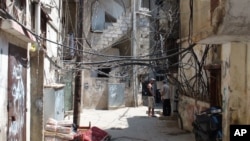This week's Middle East peace summit in Washington is setting a goal of one year to resolve what are known as final status issues -- the most intractable of Israeli-Palestinian problems. Among them is the right of return, which will determine the fate of millions of Palestinian refugees. Some people have spent decades working for what they feel should be, while others seem resigned to what is.
Farhat Farhat, 62, wishes his family had followed their dog. The refugee says he was lucky enough to be born in Palestine. But in 1948, at seven months old, he and his shepherd parents fled with their sheep and goats and crossed into Lebanon. Their dog turned around and went back home. It was, Farhat says, far more intelligent than they were.
Sitting in a narrow alley of the United Nations camp, Farhat sees no compromise on his right to return to the place of his birth. He says he has no problem with Jews. He says the two groups got along just fine, before those he refers to as the "foreign Jews" came and Israel was created. His solution is simple. The "foreigners" leave and he returns.
Even the Palestinian Authority recognizes Israel's right to exist, so, in the next 12 months, if the peace talks continue, negotiators will try to hash out a compromise.
Right to return?
Although the right of return has been a rallying cry of the Palestinian cause, Israel disputes such a "right" exists. The word does not appear in a key United Nations resolution, a non-binding one at that, which says refugees "should be permitted" to return.
For people like Farhat, it is a right and rights cannot be compromised. He is somewhat of an elder statesman in the camp, although to call it a camp is misleading. It is more a ghetto, built up through the years, blasted away at during conflicts, a series of tunnel-like alleys with little light and less air, all crisscrossed with jerry-rigged electrical wiring waiting for the next accident.
Shatila, along with its sister camp Sabra, was also the scene of a 1982 massacre by Israel's Lebanese Christian allies. Farhat would never call it home.
He says Palestinians have no basic, humanitarian rights. He argues, "People say we live here. But we don't live."
Can Lebanon be home?
Farhat blames not only the Israelis, but the Lebanese, who have warily hosted refugees for generations. Part of Lebanon's argument is that giving Palestinians more rights would weaken the cause. But absorbing them into civil society would upset a precarious ethnic-religious balance and, besides, many are still angry at what they see as the Palestinian contribution to the nation's devastating civil war.
Another problem is the sheer number of Palestinian refugees now -- from some 700,000 who left when Israel was created, to now more than four million, dispersed through the region. Israel would be hard put to accommodate them all and retain its now-insistent description as a Jewish state.
The population growth can be seen in the tumble of children careening through the maze of streets, mixing a game of soccer with a running toy gun battle. Homemade firecrackers compete with the squeal of a child escaping the pretend enemy barrage.
The father of one young boy has tried to make the idea of Palestine real to his son. Walid Taha, 47, was born in Shatila, but tells his son what he knows of the village of his heritage, the names of the streets and the people who lived there.
But as much as Taha says he loves Palestine, he cannot envision himself there. He says he has been here so long, he is different than his brother who remained behind. He says the refugees have become what they have become. Unlike his relatives in Israel, he says the refugees cannot live with the Israelis.
Price of continued conflict
Taha describes how he was born in the small room that is now the family's shop in Shatila. But he says he does not want to talk emotions, rather realities. He would just like to be allowed to set up business outside the camp. He says he is Lebanese.
The shopkeeper argues that it is not up to his generation, which he describes as one of revolution, fighting and blood. But that the next generation -- with Israeli and Palestinian children brought together through special efforts -- will have to learn to live together. He says, eventually, it will happen.
That is not the future Farhat sees. He says he was a resistance fighter for 40 years. He says he fought for his country and what he believed in. He taught his children to have the same national beliefs. He says, if the political path fails, they should fight too. He says he has given them his gun.
The political path now appears to entail stepping away from the ideas held by people like Farhat. It has been seen even in the Arab Peace Initiative of 2002, which refers to a "just solution" for the refugees. Among proposals discussed is granting the symbols of Palestinian nationality, such as a passport, while offering citizenship in other countries.
The advantages of moving ahead are mixed, but for Israel and the United States, it would weaken an argument for Islamist extremism. And, it would perhaps undercut the tactic of some Arab governments using the Palestinian cause to deflect attention from problems at home.
Shopkeeper Taha holds a simpler view. He says that, in the end, there is going to be peace -- whether the refugees like it or not. He says there will be continued violence, therefore, he says he hopes peace will come sooner rather than later.




